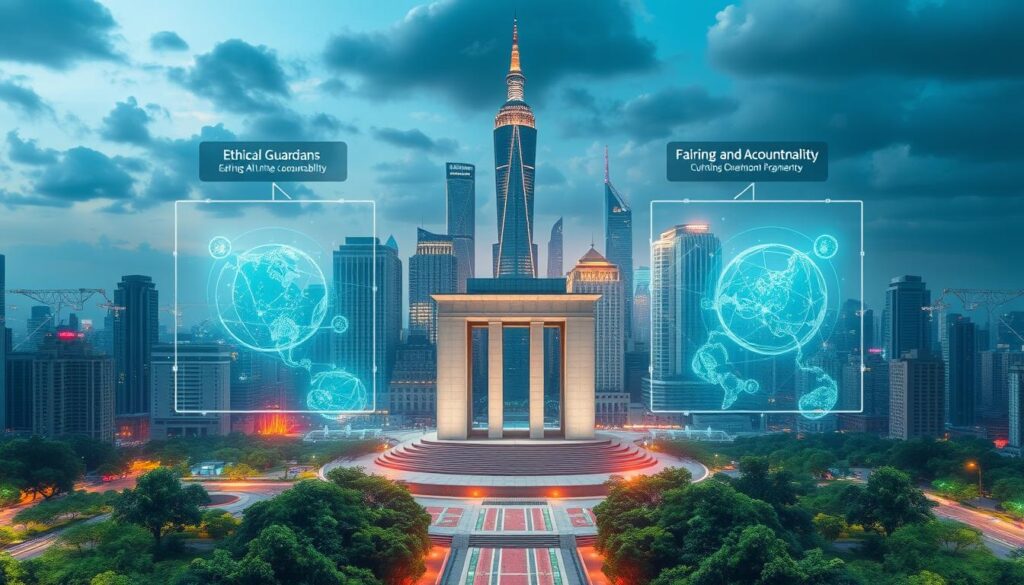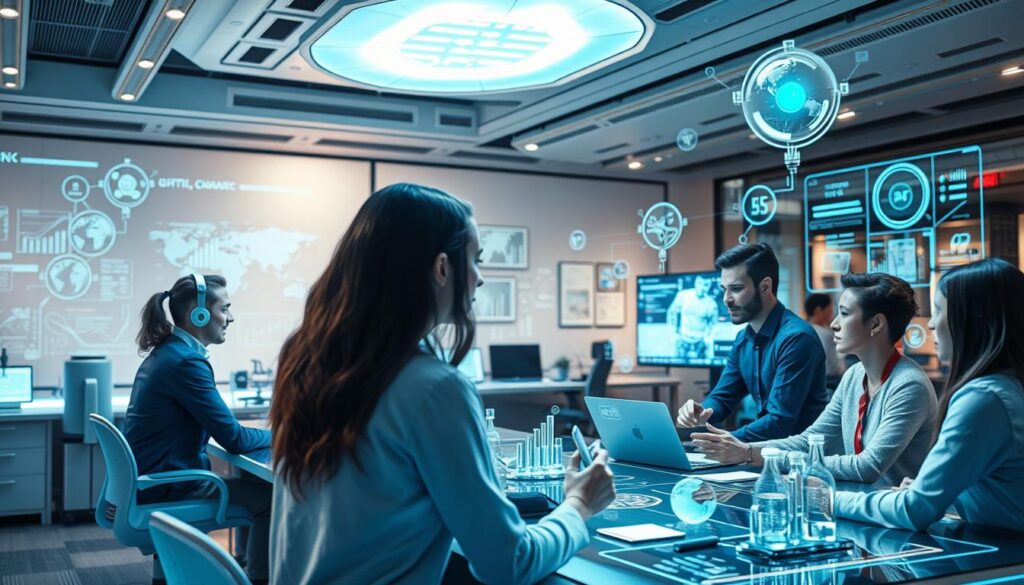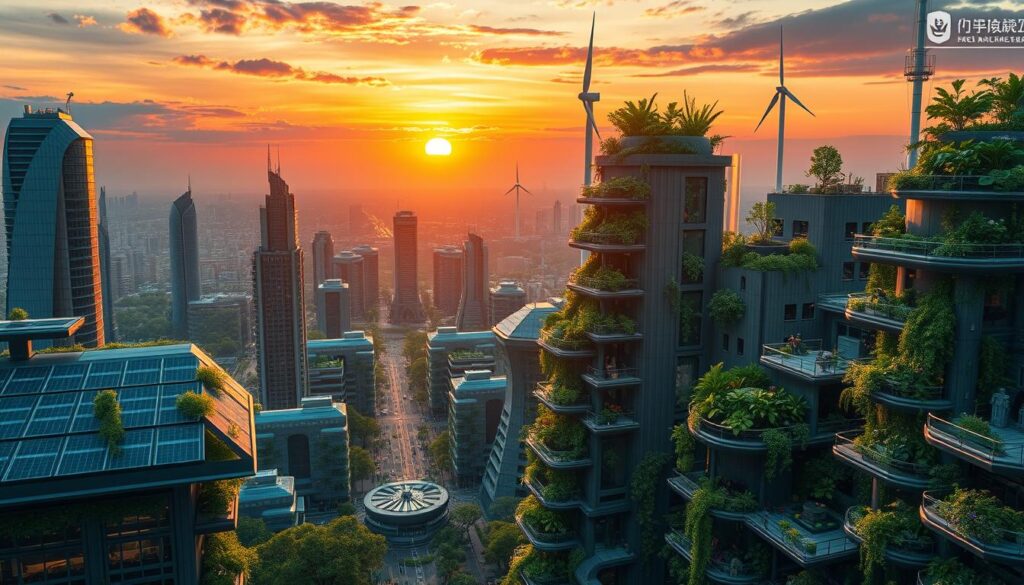The world of artificial intelligence (AI) is changing fast. New technologies are coming that will change how we live, work, and interact. It’s important to look at the new trends and advancements in AI to see what the future holds.
AI is getting smarter with faster machine learning, better natural language processing, and advanced computer vision. This article will explore how AI is evolving. We’ll look at what’s driving these changes and how AI will impact many industries.
Key Takeaways
- The future of AI is brimming with exciting innovations that will revolutionize various sectors.
- Advancements in machine learning, natural language processing, and computer vision are shaping the AI landscape.
- The transformative potential of AI spans across industries, from healthcare and transportation to finance and sustainability.
- Responsible development and ethical considerations are crucial as AI systems become more prevalent.
- Collaboration between humans and AI will be essential in navigating the workforce of the future.
Understanding the Future of AI and Its Revolutionary Impact
Artificial intelligence (AI) is changing fast, thanks to deep learning and machine learning. These advancements are making AI more important in our lives. It’s important to know where AI is now and what will shape its future.
Current State of AI Development
AI has made big steps forward in recent years. Deep learning and big data have helped in areas like computer vision and natural language processing. AI models like GPT-3 and DALL-E show AI’s ability to solve complex tasks and create human-like outputs.
Key Drivers of AI Evolution
- Exponential growth in computing power and data availability
- Breakthroughs in deep learning and neural network architectures
- Advancements in hardware, including specialized AI chips and edge computing
- Increased investment and research efforts in AI from both private and public sectors
Transformative Potential Across Industries
AI is changing many industries, from healthcare to finance. It brings automation, predictive analytics, and decision support. AI has the power to make industries more efficient and solve big global problems.
| Industry | AI’s Transformative Impact |
|---|---|
| Healthcare | Improving disease diagnosis, drug discovery, and personalized treatment plans |
| Finance | Enhancing risk management, fraud detection, and investment portfolio optimization |
| Manufacturing | Optimizing production processes, predictive maintenance, and supply chain management |
The AI revolution is changing society in big ways. It has the power to solve many global challenges. Knowing where AI is now and what will shape its future is key to understanding its impact.
“The development of full artificial intelligence could spell the end of the human race. It would take off on its own, and re-design itself at an ever-increasing rate. Humans, who are limited by slow biological evolution, couldn’t compete, and would be superseded.”
– Stephen Hawking, renowned physicist and cosmologist
Artificial General Intelligence: The Next Frontier
The field of artificial intelligence is growing fast. Now, the idea of Artificial General Intelligence (AGI) is really exciting. AGI, or “strong AI,” is a system that can do anything a human can, from solving problems to thinking creatively.
Getting to AGI is a big challenge. It needs huge steps forward in machine learning advancements. Scientists worldwide are working hard to make systems that think like us. They’re looking into new ways to build these systems, like better neural networks and language skills.
The effects of AGI on the future of AI will be huge. AGI could change many industries and how we make decisions. It could also help us learn more and solve problems faster. But, it also raises big questions about how to use this power wisely.
“The development of full artificial intelligence could spell the end of the human race. It would take off on its own, and re-design itself at an ever-increasing rate. Humans, who are limited by slow biological evolution, couldn’t compete, and would be superseded.” – Stephen Hawking
As we work towards AGI, we must think about its impact on society. We need to make sure AGI is used for good, not harm. This will be a big job for everyone involved.
The path to Artificial General Intelligence is both exciting and full of challenges. As AI keeps getting better, the quest for AGI is a key area to watch. It promises to change technology and our world in big ways.
Ethics and Governance in AI Development
Artificial intelligence (AI) is growing fast, and we need strong ethics and rules. It’s important to make sure AI helps society and doesn’t cause harm. This means we must focus on making AI systems that are fair and transparent.
Building Responsible AI Systems
Creating responsible AI needs a team effort. We must make sure AI is open, accountable, and values human ethics. This means using explainable AI and AI ethics and governance to tackle problems like bias and privacy.
Regulatory Frameworks and Compliance
We also need good rules and ways to follow them. Leaders and lawmakers are making guidelines. These rules help make sure AI is used in ways that are fair and legal.
Privacy and Security Considerations
AI uses a lot of personal data, which makes privacy and security a big issue. We need to find a balance. This balance lets us enjoy AI’s benefits while keeping our data safe.
| Key Considerations | Strategies for Responsible AI |
|---|---|
| Transparency and Explainability | Develop “explainable AI” techniques to enable stakeholders to understand AI decision-making |
| Bias and Fairness | Implement robust bias detection and mitigation methods to ensure AI systems are unbiased and equitable |
| Privacy and Security | Establish robust data governance and cybersecurity measures to protect personal information |
| Ethical Alignment | Embed ethical principles and human values into the design and deployment of AI systems |
By focusing on these key points, we can make AI development responsible and ethical. This way, AI can truly help and improve our world, not harm it.

Human-AI Collaboration and Workforce Evolution
The future of AI is changing how humans and machines work together. This new way of working, called human-AI collaboration, is making the workforce better. It lets people work with smart systems and get better at their jobs.
The impact of automation is changing jobs. Some worry AI will take all the jobs. But, AI is really helping people by doing the boring tasks. This lets workers do more important and creative work.
- AI helps people do their jobs better. It makes data analysis, decision-making, and solving problems easier.
- Jobs are changing because of AI. Now, jobs focus on what humans do best, and AI does the rest.
- AI means we need new skills. The future of AI requires people who can work with smart systems.
Companies need to help workers adapt to AI. They should offer training, change job roles, and use AI responsibly. This way, everyone can work well together in a world with more automation.
| Benefit | Impact |
|---|---|
| Augmented Human Capabilities | AI tools make employees more productive and better at making decisions. |
| Redefined Job Functions | Automation changes jobs, opening up new chances for workers. |
| Workforce Upskilling | The future of AI needs people with new skills. |

By working with AI, companies can grow and innovate. This makes sure their workers stay strong and ready for new tech.
AI and Sustainability: Addressing Global Challenges
AI is showing great promise in tackling global challenges. It’s a powerful tool against climate change, resource depletion, and environmental damage.
AI is making a big difference in fighting climate change. It can analyze huge amounts of data to predict climate trends and natural disasters. This helps policymakers, businesses, and individuals make better choices to cut down on emissions and adapt to climate change.
AI is also changing how we manage resources. It optimizes energy grids, improves waste management, and boosts precision agriculture. AI can track and control energy use, find ways to use less, and make renewable energy distribution better. It also helps sort and recycle waste, reducing landfill and ocean pollution.
| AI Application | Sustainability Impact |
|---|---|
| Climate Modeling and Prediction | Improved decision-making for climate change mitigation and adaptation |
| Energy Management and Grid Optimization | Increased efficiency and integration of renewable energy sources |
| Precision Agriculture | Reduced resource consumption and increased crop yields |
| Waste Management and Recycling | Improved waste reduction, recycling, and repurposing |
As AI evolves, its importance in solving global sustainability issues will grow. By using AI, we can aim for a sustainable future. This future will balance economic growth, protect the environment, and ensure everyone’s well-being.

“AI has the potential to be a game-changer in the fight against climate change and other sustainability issues. By leveraging data-driven insights and intelligent automation, we can develop more effective solutions to protect our planet and secure a sustainable future for generations to come.”
The Future of AI in Healthcare and Medicine
AI technology is changing healthcare forever. It’s making medical practice better in many ways. AI is helping with disease diagnosis and finding new drugs. The future of healthcare looks very promising.
AI is great at helping doctors diagnose diseases. It looks at lots of medical data to find patterns. This means doctors can catch illnesses early and treat them better.
AI is also making finding new drugs faster. It uses machine learning to find and test drug candidates. This saves time and money, getting new medicines to patients sooner.
AI is also helping with personalized medicine. Treatments are made just for each person, based on their genes and health. This makes care more effective and better for patients.
But, there are challenges with AI in healthcare. We need to make sure AI is used ethically and safely. We must protect patient privacy and make AI work well with current healthcare systems.
As healthcare keeps changing, AI will play a big role. It will help doctors give better care. This means patients will get more personalized and effective treatment, improving their lives worldwide.
Preparing for an AI-Driven Future: Education and Skills Development
The future of AI is here, and we must prepare. We need to learn new skills to succeed in this AI world. Our education and job training must keep up with AI’s fast changes.
Teaching AI basics in schools and colleges is key. This will help students understand AI and work well with it. It’s about getting ready for a world where humans and machines team up.
Also, we must encourage lifelong learning. AI is changing jobs and industries fast. Workers need to keep learning and updating their skills. This means new training programs and ways to learn on the job.
FAQ
What is the current state of AI development?
What are the key drivers of AI evolution?
How is AI transforming various industries?
What is Artificial General Intelligence (AGI), and what are the challenges in achieving it?
How can we ensure the responsible development of AI systems?
How will the relationship between humans and AI evolve in the workplace?
How can AI contribute to addressing global sustainability challenges?
What are the transformative applications of AI in healthcare and medicine?
How can we prepare for an AI-driven future through education and skills development?
What is the current state of AI development?
AI has made big strides in recent years. It has improved in machine learning, deep learning, and natural language processing. Breakthroughs in computer vision, speech recognition, and language understanding are making AI smarter and more versatile.
What are the key drivers of AI evolution?
AI’s growth is fueled by lots of data, better computing power, and new algorithms. Cloud computing, connected devices, and AI research are also driving progress.